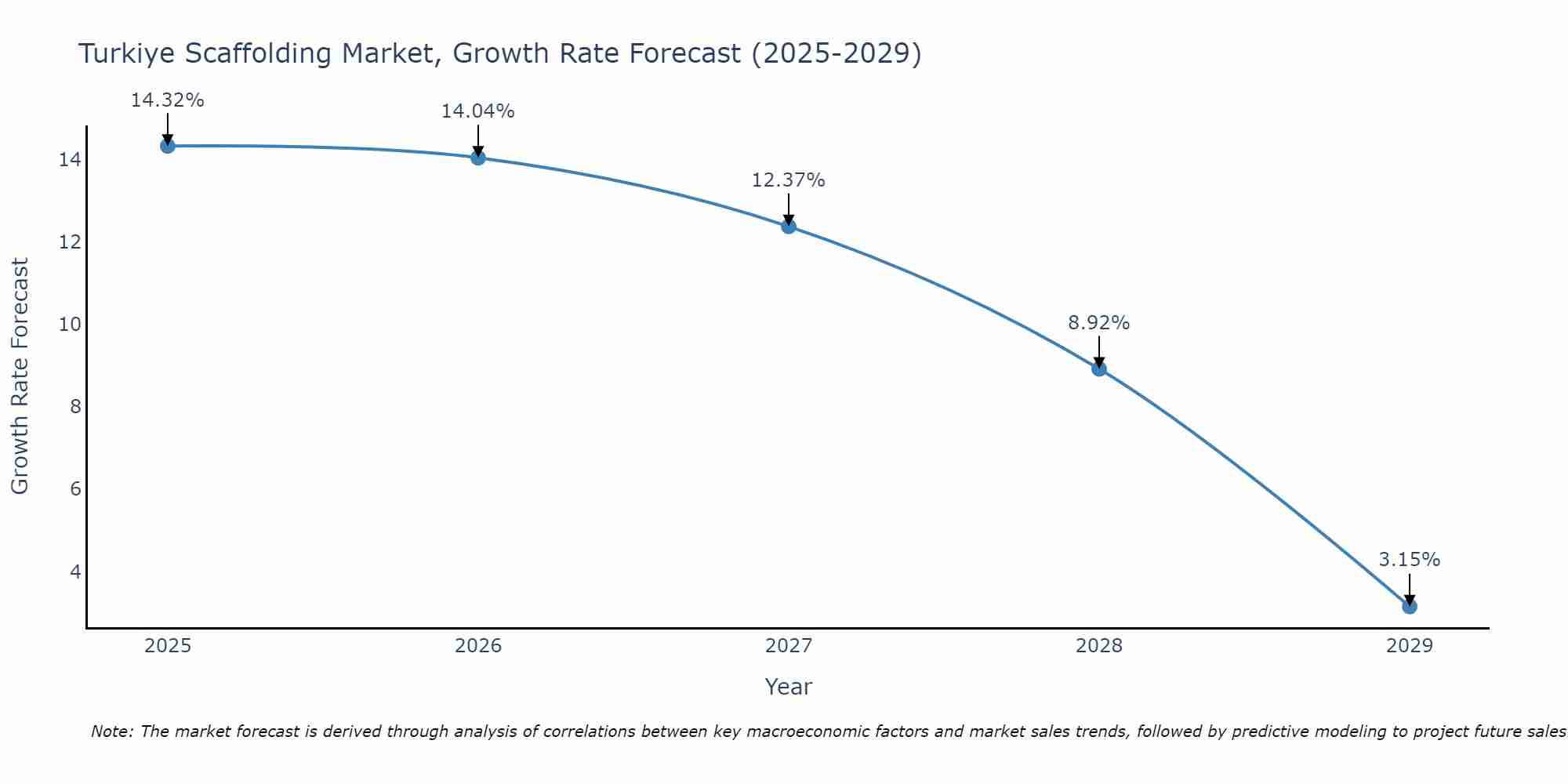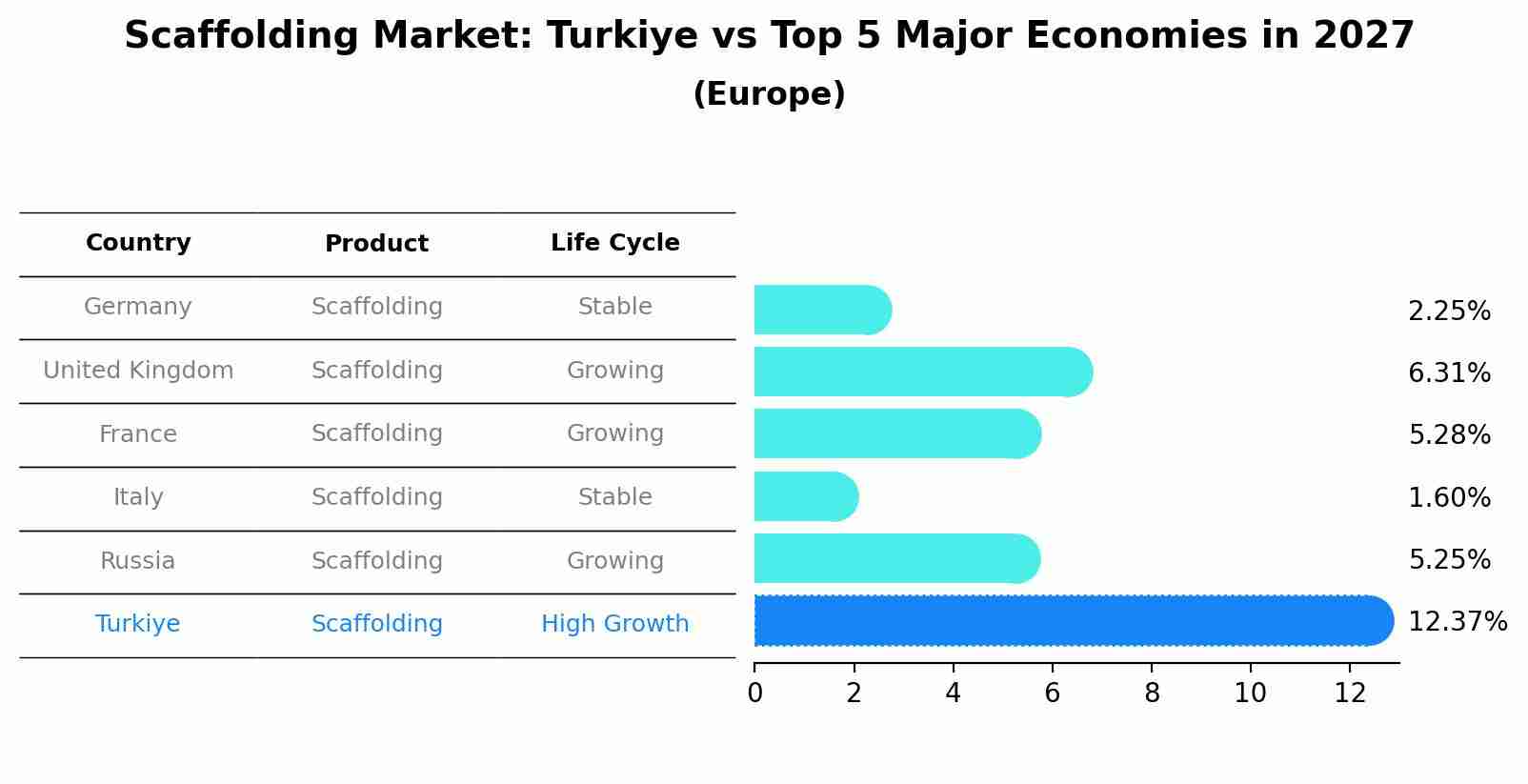Turkey Scaffolding Market Outlook | Companies, COVID-19 IMPACT, Share, Revenue, Value, Growth, Industry, Trends, Size, Analysis & Forecast
| Product Code: ETC377798 | Publication Date: Aug 2022 | Updated Date: Jul 2025 | Product Type: Market Research Report | |
| Publisher: 6Wresearch | Author: Vasudha | No. of Pages: 75 | No. of Figures: 35 | No. of Tables: 20 |
Turkiye Scaffolding Market Size Growth Rate
The Turkiye Scaffolding Market may undergo a gradual slowdown in growth rates between 2025 and 2029. Starting high at 14.32% in 2025, the market steadily declines to 3.15% by 2029.

Scaffolding Market: Turkiye vs Top 5 Major Economies in 2027 (Europe)
In the Europe region, the Scaffolding market in Turkiye is projected to expand at a high growth rate of 12.37% by 2027. The largest economy is Germany, followed by United Kingdom, France, Italy and Russia.

Turkey Scaffolding Market Synopsis
The Turkey scaffolding market is experiencing steady growth driven by infrastructure development, industrial projects, and the construction sector. Key factors contributing to market expansion include government investments in transportation, energy, and urban development projects, as well as the increasing adoption of advanced scaffolding materials and techniques for improved safety and efficiency. The market is characterized by a mix of domestic and international players offering a wide range of scaffolding solutions tailored to meet the diverse needs of the construction industry. Additionally, the growing emphasis on sustainable construction practices and stringent safety regulations are expected to further drive market growth in the coming years. Overall, the Turkey scaffolding market presents opportunities for manufacturers and suppliers to innovate and expand their presence in a dynamic and evolving industry landscape.
Turkey Scaffolding Market Trends
The Turkey scaffolding market is experiencing a shift towards safer, more durable, and environmentally-friendly solutions. There is a growing demand for lightweight and easy-to-assemble scaffolding systems that can improve construction efficiency and worker safety. Manufacturers are incorporating advanced materials such as aluminum and fiberglass to enhance durability and reduce maintenance costs. Additionally, there is a rising preference for modular scaffolding systems that offer versatility and adaptability to different project requirements. Sustainable practices are also gaining traction in the market, with a focus on eco-friendly scaffolding materials and practices to reduce environmental impact. Overall, the Turkey scaffolding market is moving towards innovation, safety, and sustainability to meet the evolving needs of the construction industry.
Turkey Scaffolding Market Challenges
The Turkey scaffolding market faces several challenges, including intense competition among suppliers leading to price wars and reduced profit margins. Additionally, fluctuations in raw material prices can impact overall costs for scaffolding companies. Safety regulations and compliance requirements are stringent, requiring companies to invest in training and equipment to ensure safe working conditions. Economic instability and political uncertainties in the region can also affect construction projects and demand for scaffolding services. Moreover, the presence of counterfeit and low-quality scaffolding products in the market poses a challenge in maintaining quality standards and reputation for legitimate suppliers. Overall, navigating these challenges requires strategic planning, innovation, and a strong focus on quality and safety standards in the Turkey scaffolding market.
Turkey Scaffolding Market Investment Opportunities
The Turkey scaffolding market presents several investment opportunities for both domestic and foreign investors. With ongoing infrastructure development projects, particularly in construction, energy, and transportation sectors, the demand for scaffolding equipment and services is expected to remain robust. Investing in scaffolding manufacturing companies or rental services could be lucrative, given the steady demand for these products. Additionally, as safety regulations become more stringent in Turkey, there is a growing need for advanced scaffolding solutions that offer enhanced safety features. Investing in innovative scaffolding technologies or training services could also be a rewarding opportunity in this market. Overall, the Turkey scaffolding market offers diverse investment avenues for those looking to capitalize on the country`s infrastructure development and construction activities.
Jordan Agar Market Government Policies
The government of Turkey has implemented various policies to regulate the scaffolding market, aiming to ensure safety standards and protect workers. The Ministry of Labor and Social Security oversees the Occupational Health and Safety Regulations, which include specific guidelines for scaffolding erection, maintenance, and use on construction sites. Additionally, the Turkish government requires scaffolding companies to obtain licenses and adhere to strict quality control measures to ensure the durability and reliability of the equipment. These regulations are enforced through regular inspections and audits by government authorities to prevent accidents and promote a safer working environment in the construction industry.
Turkey Scaffolding Market Future Outlook
The Turkey Scaffolding Market is expected to show steady growth in the coming years due to increasing construction activities, both in the residential and commercial sectors. The market is likely to be driven by infrastructure development projects, urbanization trends, and government initiatives focusing on improving the construction industry. Additionally, the adoption of advanced scaffolding systems for increased safety and efficiency on construction sites will further fuel market growth. With a growing emphasis on sustainable construction practices and the implementation of stringent safety regulations, there is a rising demand for innovative scaffolding solutions in Turkey. Overall, the Turkey Scaffolding Market is poised for expansion as the construction industry continues to thrive, presenting opportunities for market players to innovate and cater to evolving customer needs.
Key Highlights of the Report:
- Turkey Scaffolding Market Outlook
- Market Size of Turkey Scaffolding Market, 2021
- Forecast of Turkey Scaffolding Market, 2031
- Historical Data and Forecast of Turkey Scaffolding Revenues & Volume for the Period 2018 - 2031
- Turkey Scaffolding Market Trend Evolution
- Turkey Scaffolding Market Drivers and Challenges
- Turkey Scaffolding Price Trends
- Turkey Scaffolding Porter's Five Forces
- Turkey Scaffolding Industry Life Cycle
- Historical Data and Forecast of Turkey Scaffolding Market Revenues & Volume By Type for the Period 2018 - 2031
- Historical Data and Forecast of Turkey Scaffolding Market Revenues & Volume By Supported Scaffolding for the Period 2018 - 2031
- Historical Data and Forecast of Turkey Scaffolding Market Revenues & Volume By Suspended Scaffolding for the Period 2018 - 2031
- Historical Data and Forecast of Turkey Scaffolding Market Revenues & Volume By Rolling Scaffolding for the Period 2018 - 2031
- Historical Data and Forecast of Turkey Scaffolding Market Revenues & Volume By Material for the Period 2018 - 2031
- Historical Data and Forecast of Turkey Scaffolding Market Revenues & Volume By Aluminum for the Period 2018 - 2031
- Historical Data and Forecast of Turkey Scaffolding Market Revenues & Volume By Wood for the Period 2018 - 2031
- Historical Data and Forecast of Turkey Scaffolding Market Revenues & Volume By Steel for the Period 2018 - 2031
- Historical Data and Forecast of Turkey Scaffolding Market Revenues & Volume By End User for the Period 2018 - 2031
- Historical Data and Forecast of Turkey Scaffolding Market Revenues & Volume By Residential for the Period 2018 - 2031
- Historical Data and Forecast of Turkey Scaffolding Market Revenues & Volume By Commercial for the Period 2018 - 2031
- Historical Data and Forecast of Turkey Scaffolding Market Revenues & Volume By Industrial for the Period 2018 - 2031
- Turkey Scaffolding Import Export Trade Statistics
- Market Opportunity Assessment By Type
- Market Opportunity Assessment By Material
- Market Opportunity Assessment By End User
- Turkey Scaffolding Top Companies Market Share
- Turkey Scaffolding Competitive Benchmarking By Technical and Operational Parameters
- Turkey Scaffolding Company Profiles
- Turkey Scaffolding Key Strategic Recommendations
Frequently Asked Questions About the Market Study (FAQs):
Export potential assessment - trade Analytics for 2030
Export potential enables firms to identify high-growth global markets with greater confidence by combining advanced trade intelligence with a structured quantitative methodology. The framework analyzes emerging demand trends and country-level import patterns while integrating macroeconomic and trade datasets such as GDP and population forecasts, bilateral import–export flows, tariff structures, elasticity differentials between developed and developing economies, geographic distance, and import demand projections. Using weighted trade values from 2020–2024 as the base period to project country-to-country export potential for 2030, these inputs are operationalized through calculated drivers such as gravity model parameters, tariff impact factors, and projected GDP per-capita growth. Through an analysis of hidden potentials, demand hotspots, and market conditions that are most favorable to success, this method enables firms to focus on target countries, maximize returns, and global expansion with data, backed by accuracy.
By factoring in the projected importer demand gap that is currently unmet and could be potential opportunity, it identifies the potential for the Exporter (Country) among 190 countries, against the general trade analysis, which identifies the biggest importer or exporter.
To discover high-growth global markets and optimize your business strategy:
Click Here- Single User License$ 1,995
- Department License$ 2,400
- Site License$ 3,120
- Global License$ 3,795
Search
Thought Leadership and Analyst Meet
Our Clients
Related Reports
- Saudi Arabia Car Window Tinting Film, Paint Protection Film (PPF), and Ceramic Coating Market (2025-2031) | Strategy, Consumer Insights, Analysis, Investment Trends, Opportunities, Growth, Size, Share, Industry, Revenue, Segments, Value, Segmentation, Supply, Forecast, Restraints, Outlook, Competition, Drivers, Trends, Demand, Pricing Analysis, Competitive, Strategic Insights, Companies, Challenges
- South Africa Stationery Market (2025-2031) | Share, Size, Industry, Value, Growth, Revenue, Analysis, Trends, Segmentation & Outlook
- Afghanistan Rocking Chairs And Adirondack Chairs Market (2026-2032) | Size & Revenue, Competitive Landscape, Share, Segmentation, Industry, Value, Outlook, Analysis, Trends, Growth, Forecast, Companies
- Afghanistan Apparel Market (2026-2032) | Growth, Outlook, Industry, Segmentation, Forecast, Size, Companies, Trends, Value, Share, Analysis & Revenue
- Canada Oil and Gas Market (2026-2032) | Share, Segmentation, Value, Industry, Trends, Forecast, Analysis, Size & Revenue, Growth, Competitive Landscape, Outlook, Companies
- Germany Breakfast Food Market (2026-2032) | Industry, Share, Growth, Size, Companies, Value, Analysis, Revenue, Trends, Forecast & Outlook
- Australia Briquette Market (2025-2031) | Growth, Size, Revenue, Forecast, Analysis, Trends, Value, Share, Industry & Companies
- Vietnam System Integrator Market (2025-2031) | Size, Companies, Analysis, Industry, Value, Forecast, Growth, Trends, Revenue & Share
- ASEAN and Thailand Brain Health Supplements Market (2025-2031) | Strategy, Consumer Insights, Analysis, Investment Trends, Opportunities, Growth, Size, Share, Industry, Revenue, Segments, Value, Segmentation, Supply, Forecast, Restraints, Outlook, Competition, Drivers, Trends, Demand, Pricing Analysis, Competitive, Strategic Insights, Companies, Challenges
- ASEAN Bearings Market (2025-2031) | Strategy, Consumer Insights, Analysis, Investment Trends, Opportunities, Growth, Size, Share, Industry, Revenue, Segments, Value, Segmentation, Supply, Forecast, Restraints, Outlook, Competition, Drivers, Trends, Demand, Pricing Analysis, Competitive, Strategic Insights, Companies, Challenges
Industry Events and Analyst Meet
Whitepaper
- Middle East & Africa Commercial Security Market Click here to view more.
- Middle East & Africa Fire Safety Systems & Equipment Market Click here to view more.
- GCC Drone Market Click here to view more.
- Middle East Lighting Fixture Market Click here to view more.
- GCC Physical & Perimeter Security Market Click here to view more.
6WResearch In News
- Doha a strategic location for EV manufacturing hub: IPA Qatar
- Demand for luxury TVs surging in the GCC, says Samsung
- Empowering Growth: The Thriving Journey of Bangladesh’s Cable Industry
- Demand for luxury TVs surging in the GCC, says Samsung
- Video call with a traditional healer? Once unthinkable, it’s now common in South Africa
- Intelligent Buildings To Smooth GCC’s Path To Net Zero


















